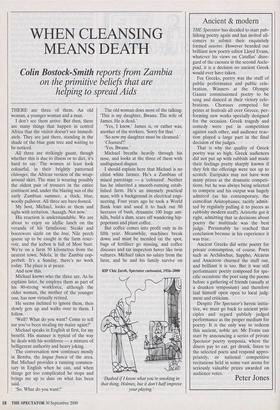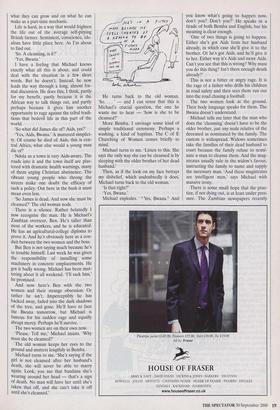WHEN CLEANSING MEANS DEATH
Colin Bostock-Smith reports from Zambia on the primitive beliefs that are helping to spread Aids
THERE are three of them. An old woman, a younger woman and a man.
I don't see them arrive. But then, there are many things that happen in central Africa that the visitor doesn't see immedi- ately. They are just there, standing in the shade of the blue gum tree and waiting to be noticed.
All three are strikingly gaunt, though whether this is due to illness or to diet, it's hard to say. The women at least look colourful, in their brightly patterned chitenges, the African version of the wrap- around skirt. The man is wearing possibly the oldest pair of trousers in the entire continent and, under the blazing sun of the early Zambian summer, a thick, blue, woolly pullover. All three are bare-footed.
My host, Michael, looks at them and sighs with irritation. `Aaaagh. Not now.'
His reaction is understandable. We are about to enjoy an idyllic lunch on the veranda of his farmhouse. Steaks and boerewors sizzle on the brai, Nile perch queue up to be caught in the farm reser- voir, and the icebox is full of Mosi beer. We're on a farm 50 kilometres from the nearest town, Ndola, in the Zambia cop- perbelt. It's a Sunday, there's no work today. The place is at peace.
And now this.
Michael knows who the three are. As he explains later, he employs them as part of his 80-strong workforce, although the older woman, the mother of the younger one, has now virtually retired.
He seems inclined to ignore them, then slowly gets up and walks over to them. I follow.
`Well? What do you want? Come to tell me you've been stealing my maize again?'
Michael speaks in English at first, for my benefit. His manner is typical of the way he deals with his workforce — a mixture of belligerent authority and heavy joking.
The conversation now continues mostly in Bemba, the lingua franca of the area. But Michael provides a running commen- tary in English when he can, and when things get too complicated he stops and brings me up to date on what has been said.
`So. What do you want?' The old woman does most of the talking. `This is my daughter, Bwana. The wife of James. He is dead.'
`Yes, I know.' James is, or rather was, another of the workers. 'Sorry for that.' `So now my daughter must be cleansed,' • 'Cleansed?'
`Yes, Bwana.'
Michael breaths heavily through his nose, and looks at the three of them with undisguised disgust.
I should explain here that Michael is no elitist white farmer. He's a Zambian of mixed parentage — a 'coloured'. Neither has he inherited a smooth-running estab- lished farm. He's an intensely practical man, with a background in electrical engi- neering. Four years ago he took a World Bank loan and used it to hack out 80 hectares of bush, dynamite 100 huge ant- hills, build a dam, scare off wandering hip- popotami and plant coffee.
But coffee comes into profit only in its fifth year. Meanwhile, machines break down and must be mended on the spot, bags of fertiliser go missing, and coffee diseases and tax inspectors hover like twin vultures. Michael takes no salary from the farm, and he and his family survive on
RIP Chic Jacob, Spectator cartoonist, 1926-2000
Dashed if I know what you're smoking in that thing, Holmes, but it don't half improve your playing.' what they can grow and on what he can make as a part-time mechanic.
Life is hard, in a way that would frighten the life out of the average self-pitying British farmer. Sentiment, conscience, ide- alism have little place here. As I'm about to find out.
`So. A cleansing, is it?'
`Yes, Bwana.'
I have a feeling that Michael knows exactly what all this is about, and could deal with the situation in a few short words. But he doesn't. Instead, he now leads the way through a long, almost for- mal discussion. He does this, I think, partly for my benefit, partly because it is the African way to talk things out, and partly perhaps because it gives, him another opportunity to rage against the tribal tradi- tions that bedevil life in this part of the world.
`So what did James die of? Aids, yes?'
`Yes, Aids, Bwana.' A muttered simplici- ty. Of course he died of Aids, this is cen- tral Africa, what else would a young man die of?
Ndola as a town is very Aids-aware. The roads into it and the town itself are plas- tered with dramatic health warnings, many of them urging Christian abstinence. The vibrant young people who throng the streets make one doubt the efficacy of such a policy. Out here in the bush it must mean even less.
`So James is dead. And now she must be cleansed?' The old woman nods.
There is a silence. Rather belatedly I now recognise the man. He is Michael's Zambian overseer, Ben. He's taller than most of the workers, and he is educated. He has an agricultural-college diploma to prove it. And he's obviously here as a con- duit between the two women and the boss.
But Ben is not saying much because he's in trouble himself. Last week he was given the responsibility of installing some machinery in concrete emplacements. He got it badly wrong. Michael has been mut- tering about it all weekend. 'I'll sack him,' he promised.
And now here's Ben with the two women and their strange obsession. Or rather he isn't. Imperceptibly he has backed away, faded into the dark shadows of the tree, and gone. He'll have to face the Bwana tomorrow, but Michael is famous for his sudden rage and equally abrupt mercy. Perhaps he'll survive.
The two women are on their own now. `Please. Tell me,' Michael insists. 'Why must she be cleansed?'
The old woman keeps her eyes to the ground and mutters lengthily in Bemba.
Michael turns to me. 'She's saying if the girl is not cleansed after her husband's death, she will never be able to marry again. Look, you see that bandana she's wearing around her head — that's a sign of death. No man will have her until she's taken that off, and she can't take it off until she's cleansed.' He turns back to the old woman. `So... ' — and I can sense that this is Michael's crucial question, the one he wants me to hear — 'how is she to be cleansed?'
More Bemba. I envisage some kind of simple traditional ceremony. Perhaps a washing, a kind of baptism. The C of E Churching of Women comes briefly to Mind.
Michael turns to me. 'Listen to this. She says the only way she can be cleansed is by sleeping with the older brother of her dead husband.'
Then, as if the look on my face betrays my disbelief, which undoubtedly it does, Michael turns back to the old woman.
`Is that right?'
`Yes, Bwana.'
Michael explodes. "Yes, Bwana." And you know what's going to happen now, don't you? Don't you?' He speaks in a tirade of both Bemba and English, but his meaning is clear enough.
`One of two things is going to happen. Either she's got Aids from her husband already, in which case she'll give it to the brother. Or he's got Aids, and he'll give it to her. Either way it's Aids and more Aids. Can't you see that this is wrong? Why must you do this thing? Isn't there enough death already?'
This is not a hitter or angry rage. It is the rage of a father who drills his children in road safety and then sees them run out into the road chasing a football.
The two women look at the ground. Their body language speaks for them. The Bwana doesn't understand.
Michael tells me later that the man who does the 'cleansing' doesn't have to be the older brother, just any male relative of the deceased as nominated by the family. The custom is widespread. Widows sometimes take the families of their dead husband to court because the family refuse to nomi- nate a man to cleanse them. And the mag- istrates usually rule in the widow's favour, instructing the family to name and supply the necessary man. 'And these magistrates are intelligent men,' says Michael with massive irony.
There is some small hope that the prac- tice, if not dying out, is at least under pres- sure. The Zambian newspapers recently reported a case where enlightened tribal elders ruled against this traditional 'cleans- ing' procedure, deciding that a ceremonial smearing of ash on the forehead of the widow would suffice.
(Unfortunately, the uncle of the deceased husband, previously nominated as the prospective 'cleanser' but now deprived of his privilege, reacted to this ruling by breaking into the widow's home and raping her.) But no such spirit of enlightenment exists among the people who live on and around Michael's remote farm.
Now, in one last attempt to stop the inevitable, Michael turns to talk directly to the young widow, keeping his anger tightly in check.
`Look, you don't have to do this. Take no notice of your family. Just throw the bandana away. Then get married again. You don't have to do this.'
The young woman shakes her head and looks at her feet in the dust..
Her mother speaks rapidly in Bemba, the gist being that if the girl is not cleansed, then her next marriage will be cursed. And anyway, it is the tradition.
Michael glares at her, then turns to me and mutters the ultimate derogatory African term — Minor I look closely at the young woman, the centre of this storm. She's pretty, it's a face you might see on any British street. But I know the odds are that she already has Aids.
I have learnt to look for the signs — a pink colour inside the lips, the slight straightening of tightly curled hair. I imag- ine I can see the skull beneath the skin. And for this victim there will be no AZT, no cocktail of drugs to normalise, or even prolong, her life.
Michael sighs. 'So. She's going to sleep with his brother and be cleansed. Okay, so what has that got to do with me? Why are you here?'
At last we have reached the point of the interview, the reason why the two women have come. The old woman explains that the older brother requires a fee to `cleanse' the widow. Forty thousand kwacha. About £10.
This thought infuriates me; but Michael's anger is spent. He reaches into his pocket, opens his wallet and hands over four typi- cally dirty 10,000-kwacha notes. Then he makes a dismissive gesture.
The mother and daughter turn and slowly walk away in the dust, along the rutted track between the small cattle pen and the farm tractors, away towards the collection of huts where they live, under the acacia trees.
Michael turns to me and perhaps there's an accusation in my glance. After all, hasn't he just financed a meaningless and dangerous charade?
`I'll take it out of their wages,' he says, in a tone that defies any further discussion.
At Ndola Central Hospital 70 per cent of in-patients test HIV positive.




























































































 Previous page
Previous page